 Petzlover
Petzlover Golden Doodle is originated from United States but Miniature English Bulldog is originated from United Kingdom. Golden Doodle may grow 31 cm / 13 inches higher than Miniature English Bulldog. Both Golden Doodle and Miniature English Bulldog are having almost same weight. Golden Doodle may live 3 years more than Miniature English Bulldog. Golden Doodle may have more litter size than Miniature English Bulldog. Both Golden Doodle and Miniature English Bulldog requires Moderate Maintenance.
Golden Doodle is originated from United States but Miniature English Bulldog is originated from United Kingdom. Golden Doodle may grow 31 cm / 13 inches higher than Miniature English Bulldog. Both Golden Doodle and Miniature English Bulldog are having almost same weight. Golden Doodle may live 3 years more than Miniature English Bulldog. Golden Doodle may have more litter size than Miniature English Bulldog. Both Golden Doodle and Miniature English Bulldog requires Moderate Maintenance.
 The Goldendoodle, known fondly as the Golden Poo, originates from the USA and was first bred in the 1990’s, coming about because of two popular dog breeds being mated together – the Golden Labrador and the Poodle.
The Goldendoodle, known fondly as the Golden Poo, originates from the USA and was first bred in the 1990’s, coming about because of two popular dog breeds being mated together – the Golden Labrador and the Poodle.
He isn’t recognized as a standardized breed by any of the major kennel clubs. The beautiful dog was first bred in 1969 by Monica Dickens, and of course when everybody saw the little golden ball of sheer delight, everybody wanted one and the dog’s popularity soared.
The original purpose of the cross-breed was to develop guide dogs which would go down well with people with allergies. Today, not all Goldendoodles are hypoallergenic, but they’re also popular because they have a low shedding coat.
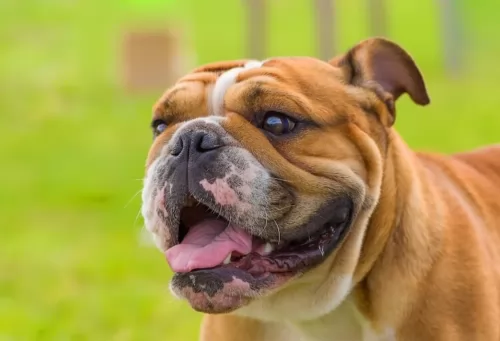 The Miniature Bulldog is such a cute little dog, hailing from England in the 18th and early 19th centuries. The exact development of the dog is unclear and it seems as though the breeders weren’t working together and were working in two different directions.
The Miniature Bulldog is such a cute little dog, hailing from England in the 18th and early 19th centuries. The exact development of the dog is unclear and it seems as though the breeders weren’t working together and were working in two different directions.
There is a lot of debate about the very name ‘miniature’ too because some breeders gave this name to a hybrid mix of a Pug and Bulldog. It seems some breeds were created by crossing English Bulldogs with French Bulldogs to decrease their size. Certainly the origins for the Miniature Bulldog are unknown and there isn’t one particular breeder who can be credited with developing the breed.
Because the Miniature Bulldog is a hybrid breed, it isn’t accepted by the AKC, but it is accepted by the American Canine Hybrid Club as well other registries.
 The Goldendoodle is a medium sized dog, standing between 61 -66 cm in height and weighing between 14 – 20kg. Nothing is set in stone with regards to his size as the Poodle can be Toy, Miniature and Standard, meaning the Goldendoodle can be a smallish dog or he can be a large dog.
The Goldendoodle is a medium sized dog, standing between 61 -66 cm in height and weighing between 14 – 20kg. Nothing is set in stone with regards to his size as the Poodle can be Toy, Miniature and Standard, meaning the Goldendoodle can be a smallish dog or he can be a large dog.
His coat is usually golden, cream, yellow, red and even leaning towards brown or black. It is mostly medium length and wavy or even curly. Many Goldendoodle owners send their pets in to have their coats professionally shorn.
He has medium length, floppy ears and the tail is long.
Making the most wonderful family pet and companion, Goldendoodles have just the right temperament for them to be used as therapy- or rescue dogs. They’re bright, outgoing alert, social, gentle, loving, patient with children, adults and pets and friendly and amicable as well.
They’ve inherited wonderful characteristics from both the poodle and the Golden Labrador. He is an energetic dog so even though he adapts well to city life or country life, he will need to have exercise as in walks and ball games.
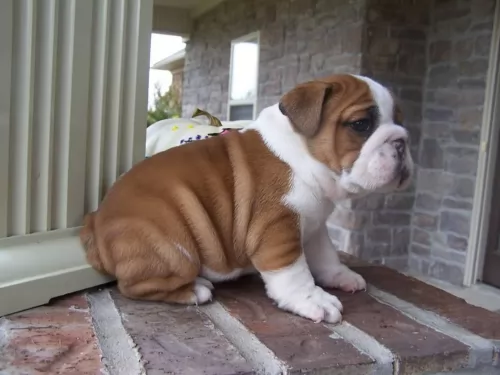 Because the Miniature Bulldog is a cross between two purebred breeds – the Pug and the English Bulldog. You can expect different looks and characteristics from each breed.
Because the Miniature Bulldog is a cross between two purebred breeds – the Pug and the English Bulldog. You can expect different looks and characteristics from each breed.
Your mini Bulldog is a small breed dog standing between 25 and 35cm male and female and weighing between 11 and 18kg. The average litter size for these dogs is about 4 puppies.
The Miniature Bulldog has a short coat which sheds moderately and that comes in different colors such as tan and white, brindle, with black and grey also having a show in.
The Miniature Bulldog is a social, friendly breed who is able to get on well with all members of the family, including children and pets in the home. His very stature makes it that he isn’t the most active of dogs, but nonetheless you still want to exercise him and take him for walks to avoid obesity.
As with all dogs, training and socialization are imperative because this is a strong-willed dog who wants to go his own way.
 Your Goldendoodle is sure to be a real joy in your home. He is a lively, healthy dog breed and when you treat him like a family member, a real deep bond can be developed.
Your Goldendoodle is sure to be a real joy in your home. He is a lively, healthy dog breed and when you treat him like a family member, a real deep bond can be developed.
He loves to be included in everything going on in the household and doesn't like being left alone for a long time. He has wonderful characteristics from the Golden Retriever and the Poodle as both these dog breeds are known for their friendly, patient, kind, amicable and intelligent personalities.
Easy to train, your Goldendoodle is obedient and wants to please, and is just waiting to become a loyal, loving friend in your family.
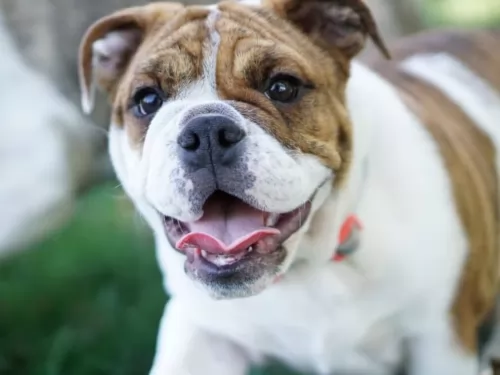 You’ll love having one of these entertaining, friendly dogs by your side. He is docile, social, fun and a bit stubborn too but he is able to get on well with children in the home as well as with other pets.
You’ll love having one of these entertaining, friendly dogs by your side. He is docile, social, fun and a bit stubborn too but he is able to get on well with children in the home as well as with other pets.
He can adapt to life in the city as well as in the countryside as he doesn’t require too much exercise.
Take special care of him and he’ll make you a splendid family pet.
 The Goldendoodle is a healthy dog, but each breed involved with bringing about the Goldendoodle - Poodles and Golden Retrievers – can be prone to hip dysplasia. Both dog breeds are also susceptible to inheritable eye disorders.
The Goldendoodle is a healthy dog, but each breed involved with bringing about the Goldendoodle - Poodles and Golden Retrievers – can be prone to hip dysplasia. Both dog breeds are also susceptible to inheritable eye disorders.
There are some common dog ailments worth knowing about. The idea is to get your pet to the vet as soon as possible when you detect that he isn’t his usual self.
Allergic skin disease is common in other dog breeds as well, and once the allergen is inhaled or absorbed, your pet can battle terribly with itchy, red skin. This inflammatory, chronic skin disease can drive your pet mad and you’ll see him scratching and licking continually. Get him to the vet as soon as possible because it may just be a case of changing his diet.
This is something that can even be seen in young dogs when the hip joints don’t develop normally. It can cause arthritis, terrible pain and lameness with your pet.
You’ll notice that your pet battles to see- and get around at night. Signs of night blindness can lead to loss of vision, particularly with your middle-aged Goldendoodle.
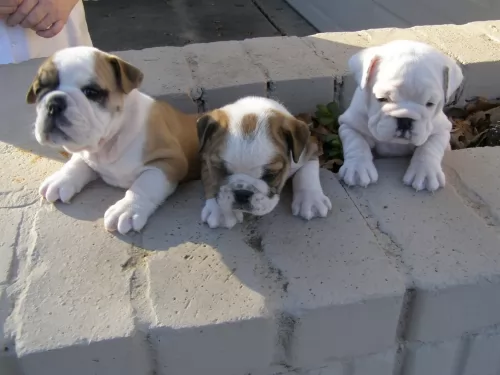 Unfortunately the origins of the Miniature English Bulldog are not 100% clear and therefore other important information isn't readily available.
Unfortunately the origins of the Miniature English Bulldog are not 100% clear and therefore other important information isn't readily available.
These dogs are always prone to breathing and nasal abnormalities because of the shape of their faces as well as being prone to heart deficiencies. Snoring, grunting and quite a bit of panting is part and parcel of the mini English Bulldog.
They’re also prone to overheating, cherry eye and hip dysplasia. It is most unlikely that your Miniature English Bulldog is going to get any of these illnesses and the good news is that he can live to be up to 12 years of age.
 Taking care of a Goldendoodle isn't only about feeding him and seeing he has a fresh bowl of water available. It’s about making him part of the family and giving him love and attention just like with any family member. He needs -
Taking care of a Goldendoodle isn't only about feeding him and seeing he has a fresh bowl of water available. It’s about making him part of the family and giving him love and attention just like with any family member. He needs -
Good nutritious food to keep him healthy.
A warm dry place to sleep at night.
A place during the day that offers shade from the sun and shelter from the rain.
He needs to be brushed to remove loose hairs, have his nails trimmed, his ears checked for infection and his teeth brushed 2 or 3 times a week.
He needs to be exercised – walks, ball and rope games, swimming and joining you in your activities.
He needs to be taken to the vet when he is showing signs of illness.
He needs love, care and attention just like any other family member.
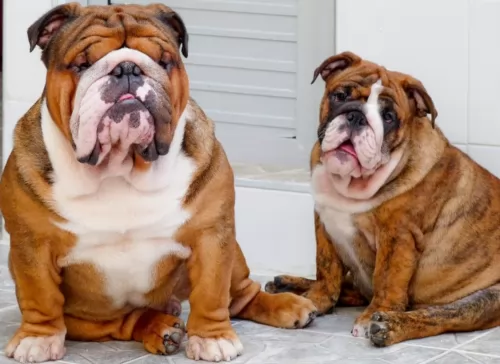 Feeding the Miniature English Bulldog is hugely important. It is imperative that he doesn't become obese. Buy the best dog food there is and see to it that he also gets some home-made food. Chop up boiled chicken, brown rice ad vegetables for your pet and mix occasionally into his dry kibble.
Feeding the Miniature English Bulldog is hugely important. It is imperative that he doesn't become obese. Buy the best dog food there is and see to it that he also gets some home-made food. Chop up boiled chicken, brown rice ad vegetables for your pet and mix occasionally into his dry kibble.
Dogs love simple food – their stomachs can’t cope with different foods. They appreciate consistency with uncomplicated but nutritious foods. The bulldog is a dog which can easily overheat, so make sure he has constant access to fresh cool drinking water. On a hot day you can even use a spray bottle and allow some spray mist sprayed into his face to cool him down.
The Mini English Bulldog is a dog that sheds so you will need to brush him at least twice a week to get rid of loose hair.
Check around his eyes and inside his ears for infection.
Brush his teeth 2 or 3 times a week to get rid of plaque so as to prevent dental decay which can be detrimental to his health.
His face and body have wrinkles, making him more susceptible to skin allergies and you’ll need to keep your eye open for these as they can be terribly painful and frustrating for your pet.
Keep his nails trimmed.
He is neither sleek, agile or quick and you can see just by looking at him that he isn’t designed for being sporty. A slow walk every day will be enough for him as well as some easy-going games inside.